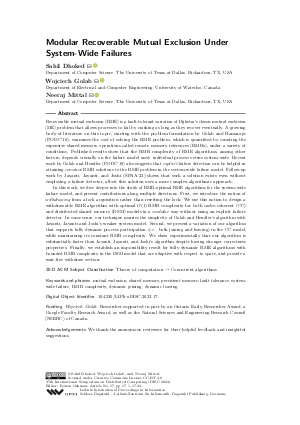@InProceedings{dhoked_et_al:LIPIcs.DISC.2023.17,
author = {Dhoked, Sahil and Golab, Wojciech and Mittal, Neeraj},
title = {{Modular Recoverable Mutual Exclusion Under System-Wide Failures}},
booktitle = {37th International Symposium on Distributed Computing (DISC 2023)},
pages = {17:1--17:24},
series = {Leibniz International Proceedings in Informatics (LIPIcs)},
ISBN = {978-3-95977-301-0},
ISSN = {1868-8969},
year = {2023},
volume = {281},
editor = {Oshman, Rotem},
publisher = {Schloss Dagstuhl -- Leibniz-Zentrum f{\"u}r Informatik},
address = {Dagstuhl, Germany},
URL = {https://drops.dagstuhl.de/entities/document/10.4230/LIPIcs.DISC.2023.17},
URN = {urn:nbn:de:0030-drops-191431},
doi = {10.4230/LIPIcs.DISC.2023.17},
annote = {Keywords: mutual exclusion, shared memory, persistent memory, fault tolerance, system-wide failure, RMR complexity, dynamic joining, dynamic leaving}
}

 Creative Commons Attribution 4.0 International license
Creative Commons Attribution 4.0 International license











































